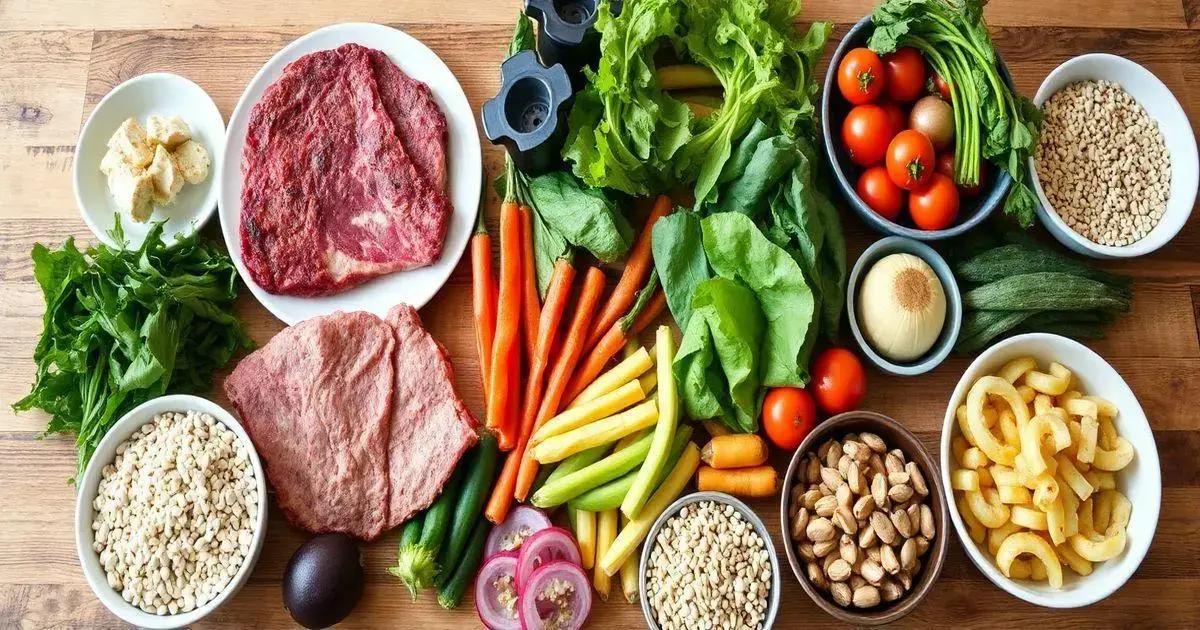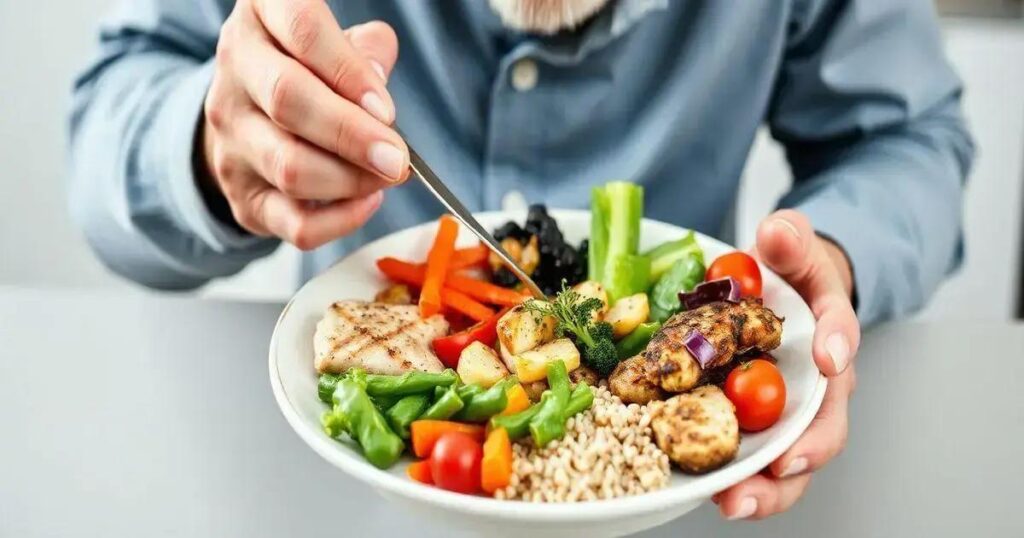The rise of hormone-friendly diets tailored for men over 50 focuses on whole foods that improve hormonal balance, enhance energy, and promote overall wellness, making it a vital lifestyle choice for better health in later years.
The rise of hormone-friendly diets tailored to men over 50 marks a revolutionary shift in dietary approaches. As men enter their golden years, understanding how diet influences hormonal balance becomes crucial. These diets prioritize nutrients that support hormone health, promoting vitality and overall well-being. This article explores the fundamentals of these diets, their unique benefits for men over 50, practical tips for implementation, and inspiring success stories.
Understanding Hormone-Friendly Diets

Understanding hormone-friendly diets is essential for men over 50 who want to maintain health and vitality. These diets focus on foods that could help regulate hormones naturally. As men age, hormone levels can fluctuate, affecting mood, energy, and weight. Hormone-friendly diets emphasize whole, nutrient-rich foods that support the body’s hormonal balance.
Key Components of Hormone-Friendly Diets
These diets typically include:
- Lean Proteins: Foods like chicken, fish, and beans help maintain muscle mass and support hormone production.
- Healthy Fats: Sources such as avocados, nuts, and olive oil are crucial for optimal hormone function.
- Fruits and Vegetables: A variety of colorful produce is rich in antioxidants and vitamins that contribute to overall health.
- Whole Grains: Foods like brown rice and quinoa provide fiber, which aids digestion and maintains stable blood sugar levels.
The Role of Micronutrients
Micronutrients also play a vital role in hormone health. Nutrients such as zinc, magnesium, and vitamins D and B6 are essential for hormone regulation. These can be found in foods like green leafy vegetables, nuts, seeds, and lean meats.
Personalized Approaches
Every individual’s body responds differently to various foods, so a personalized approach is recommended. Consulting with a healthcare provider or a nutritionist can help tailor a diet plan that meets specific needs. This way, men can understand how their bodies react to certain foods and make informed choices.
Key Benefits for Men Over 50

Key benefits for men over 50 who adopt hormone-friendly diets can be transformative. These diets help target common issues that arise with age, leading to improved overall health and wellness.
Enhanced Energy Levels
One of the primary benefits is a boost in energy levels. Hormone-friendly foods provide the necessary nutrients that can help maintain stable energy throughout the day. This helps men feel more active and engaged in daily activities.
Improved Mood and Mental Clarity
These diets can also contribute to better mood and mental clarity. Foods rich in omega-3 fatty acids and antioxidants may reduce feelings of anxiety and depression, leading to a more positive mindset.
Weight Management
Men over 50 often struggle with weight management due to hormonal changes. A hormone-friendly diet, focusing on whole foods and healthy fats, can aid in maintaining a healthy weight and reducing body fat.
Better Hormonal Balance
Emphasizing foods that promote hormonal health can lead to improved balance in testosterone levels and other hormones. This affects not only physical health but also libido and sexual wellness.
By embracing hormone-friendly diets, men over 50 can experience significant benefits that enhance their quality of life, making it an important lifestyle choice.
Tips for Implementing These Diets

Tips for implementing hormone-friendly diets effectively can help men over 50 transition smoothly into a healthier way of eating. Here are some actionable strategies:
Start Gradually
Begin by making small changes to your diet. Instead of overhauling your entire meal plan overnight, try swapping out one unhealthy item for a healthier option each week. This makes the process less overwhelming.
Focus on Whole Foods
Prioritize whole, natural foods in your meals. This includes vegetables, fruits, whole grains, lean proteins, and healthy fats. The less processed your food is, the better it will be for your hormone health.
Plan Your Meals
Meal planning can help ensure you stick to your hormone-friendly goals. Write a weekly meal plan and prepare shopping lists. This reduces the temptation to buy unhealthy snacks or opt for fast food.
Stay Hydrated
Drinking plenty of water is essential. Aim for at least eight glasses a day. Staying hydrated helps maintain energy levels and supports overall metabolism.
Listen to Your Body
Pay attention to how different foods affect your body. Keeping a food diary may help you identify what works best for your unique needs. Adjust your diet based on your observations.
Seek Professional Guidance
Consider consulting a nutritionist or dietitian who specializes in hormone health. They can offer personalized advice and help you create a diet plan tailored to your specific needs and preferences.
Success Stories and Testimonials

Success stories and testimonials can inspire those considering hormone-friendly diets. Many men over 50 have experienced positive changes by adopting this lifestyle. Here are a few illustrative stories:
John’s Transformation
After starting a hormone-friendly diet, John, 55, lost 20 pounds in three months. He focused on whole foods and cut back on processed snacks. “I feel more energetic and my mood has improved. I never thought a diet could make such a big difference!” he shares.
Michael’s Vitality Boost
Michael, a 62-year-old retired teacher, decided to try hormone-friendly eating after struggling with fatigue. By including more healthy fats and protein in his meals, he gained increased energy and clarity. “I feel like I can keep up with my grandkids again!” he says.
David’s Health Improvements
At 58, David was experiencing low testosterone levels. After implementing a hormone-friendly diet, rich in zinc and omega-3 fatty acids, he noticed significant improvements. “Not only did I lose weight, but my doctor said my hormone levels have stabilized,” he reports.
Community Support
Many men have found success by engaging with community support groups. Sharing recipes and tips has made the journey enjoyable. As one participant notes, “Having a community makes all the difference. We’re in this together!” With consistent support and encouragement, many men are thriving on their hormone-friendly diets.
Embracing Hormone-Friendly Diets for a Healthier Future
The rise of hormone-friendly diets tailored for men over 50 offers an exciting opportunity to enhance overall health and well-being. By understanding the key components of these diets, men can experience increased energy levels, improved mood, and better hormonal balance.
Implementing these diets is made easier with practical tips and community support, fostering a sense of belonging in this health journey. Success stories and testimonials reveal how transformative these changes can be, motivating others to take action. With dedication to a hormone-friendly diet, men over 50 can not only improve their quality of life but also embrace a vibrant and fulfilling lifestyle.
Investing in health now can lead to lasting benefits for years to come.
FAQ – Frequently Asked Questions about Hormone-Friendly Diets for Men Over 50
What is a hormone-friendly diet?
A hormone-friendly diet focuses on whole, nutrient-dense foods that help regulate hormone levels naturally, improving overall health.
What are the key benefits of a hormone-friendly diet for men over 50?
Benefits include enhanced energy levels, improved mood, better weight management, and greater hormonal balance.
How can I start implementing a hormone-friendly diet?
Start gradually by making small changes, focusing on whole foods, planning meals, staying hydrated, and seeking professional guidance.
Are there any success stories from men who adopted these diets?
Yes, many men report positive transformations, including weight loss, increased energy, and improved hormone levels after switching to hormone-friendly diets.
What types of foods should I include in my hormone-friendly diet?
Include lean proteins, healthy fats, fruits, vegetables, and whole grains to support hormonal health.
Can I get support while transitioning to this diet?
Yes, joining support groups or communities can provide motivation and share helpful tips for sticking to your new diet.













